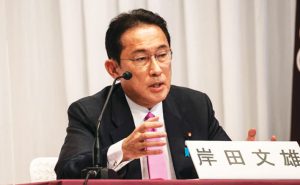BLOOMBERG
Japanese Prime Minister Fumio Kishida received a much-sought rise in his support rate after a trip to Ukraine met with broad approval from the public ahead of a series of local and special elections.
A survey by the Nikkei newspaper and TV Tokyo conducted March 24-26 found 48% of respondents said they supported Kishida’s cabinet, up five percentage points on the previous month and — for the first time in seven months — higher than the proportion who said they didn’t support him.
Kishida’s sagging public approval had made it harder for him to control his long-ruling Liberal Democratic Party (LDP) and threatened its prospects in a series of local elections next month. The success of the surprise visit to Kyiv and a rare summit with South Korean President Yoon Suk-yeol have revived talk of a general election as soon as June.
Kishida is set to host the Group of Seven summit from May 19-21 in his home town of Hiroshima. He had been under pressure to make the Ukraine trip to stay in line with the other G-7 countries, who have all sent their leaders since Russia’s full-scale invasion about a year ago.
Kishida used the visit to show support for Kyiv and invited President Volodymyr Zelenskiy to participate in the group’s summit.
Asked their opinion of Kishida’s trip to Ukraine, 71% of respondents to the Nikkei poll released on Monday said they approved, compared with 20% who said they didn’t. About 63% approved of the Yoon summit, which came after the South Korean president proposed a domestic solution to claims against Japanese companies over damages for use of conscripted labor during Japan’s 1910-1945 colonisation of the Korean Peninsula.
A pledge to hike handouts for couples who both take parental leave after the birth of a child also secured approval from more than two thirds of poll respondents, as Kishida seeks to tackle what he’s called the “national crisis†of Japan’s aging and shrinking population.
The LDP and its junior coalition partner Komeito face local and special elections on April 9 and 23. The prime minister need not call a general election until 2025, but has the power to do so whenever he wishes.
While none of the opposition parties has support of more than single figures, any significant loss of seats could undermine Kishida’s hold over the party, as he seeks to push through a major hike in defense spending.
 The Gulf Time Newspaper One of the finest business newspapers in the UAE brought to you by our professional writers and editors.
The Gulf Time Newspaper One of the finest business newspapers in the UAE brought to you by our professional writers and editors.
